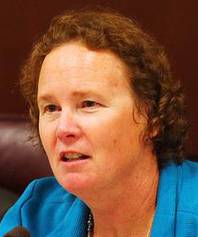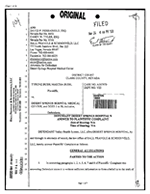Sunday, Aug. 8, 2010 | 2 a.m.
Do No Harm: Hospital Care in Las Vegas, Part 2
- A hidden epidemic
- Hospital stay will stay with her always
- VA system stanching MRSA
- Hospital’s sanitation promises quickly forgotten
- Billing codes key to data analyzed on infections
- Where I Stand: Rise in infection rates, hospitals’ reticence are troublesome
- Editorial: Hospitals should do more to protect patients from deadly bacteria
- ‘We’re the ones who are in there. Our lives are entrusted to them.’
- Health board backs limits on disclosure of infections
- How best to stem spread of infection?
- St. Rose breaks ranks with disclosure on quality of care
Share your stories
The Veterans Affairs Department is determined to eliminate the spread of MRSA within its facilities, and has virtually eliminated the infections within some of its hospitals.
One reason for the VA's success: Every patient is swabbed upon admission to determine if he is infected with the resilient superbug, and, if so, is then separated from patients who are not.
VA officials say this strategy has paid for itself by reducing the cost of treating the infections by the bacterium, Methicillin-resistant Staphylococcus aureus, which thrives in hospital settings.
Other hospital operators in the Las Vegas Valley have not followed the VA's lead in screening all incoming patients for the infection, saying it is unnecessary and that their current methods of fighting MRSA are suitable. The hospitals follow standards set by the Centers for Disease Control and Prevention — which praises the effectiveness of the VA's program, but does not make it a standard for others to follow.
Dr. Rajiv Jain, who leads the VA's MRSA prevention program, said achieving any measure of success requires a new way of thinking about infections: Hospitals should aspire to eliminate them versus comparing how their infection rates rank with other hospitals' rates, and feeling smug if they compare well.
"We're not satisfied when the rate is any higher than zero," Jain said.
The VA had a 59 percent decrease in hospital-acquired MRSA cases in intensive care units nationwide from October 2007 to March 2009, and a 29 percent decrease in non-ICU cases from October 2007 to November 2008. Some facilities have reduced their rates to almost zero, Jain said.
The VA's mind-set and methods are in place at all 153 acute care VA hospitals nationwide, including the O'Callaghan Federal Hospital at Nellis Air Force Base.
Dr. Ramu Komanduri, chief of staff at O'Callaghan, said the screening showed that 8 percent of incoming patients are either infected with MRSA or are carriers who can infect others. Each tests costs about $25 and results take about two hours, he said. Patients with the bacterium are immediately isolated.
The VA also tests patients before they are transferred internally and at discharge, to identify whether they picked up MRSA at the facility.
Komanduri said he can't remember the last time O'Callaghan had a hospital-acquired MRSA infection. The hospital has fewer than 100 beds.
In contrast, other Las Vegas hospitals screen only high-risk patients, such as those in critical care and those who have infected open wounds or catheters. They do not screen patients when they're discharged.
Some academics argue against screening every incoming patient, saying it is expensive, supported by limited evidence and does not address the other bacteria that can be combated with a broader infection-control program.
University Medical Center officials said there is "no scientific basis for universal screening."
Jain agrees that the science is inconclusive as to whether universal screening controls MRSA. Screening every patient, he notes, is merely one part of the VA system's "bundled approach," which includes hand hygiene, contact precautions and isolation for colonized or infected patients. Central to the strategy is a culture shift that encourages workers to challenge others — even doctors — to practice good hand hygiene. The signal: upturned hands.
"I know the bundled approach works," Jain said. "But I don't know which component of the bundle is the most essential component of success."
Some European countries and a few American hospitals say their infection-fighting strategies have been successful when they included the screening of new patients.
Universal screening also makes financial sense, Jain said. "We have prevented dozens and dozens of infections. It's more cost effective to do this prevention work than to have the cost of treating the infection — let alone the human toll of pain and suffering from an infection."
Although it may be debatable whether hospitals should test every patient for MRSA, there is no question they must aggressively identify every patient colonized by the bacterium to prevent its spread, said Dr. Barry Farr, an infectious disease specialist and professor emeritus at the University of Virginia.
Farr pushes health care providers to more aggressively fight MRSA in their facilities and on a communitywide basis because patients can carry it from one hospital to the next.
Farr was encouraged that Las Vegas hospitals are screening high risk patients, as long as they aggressively pursue every patient who carries MRSA.
"Once they start doing it, if they see a bunch, maybe it will lead to them doing more," Farr said of the screening.
Most American hospitals, including Las Vegas', follow the direction of the CDC on infection prevention. But critics, including a 2008 report by the Government Accountability Office, say the agency makes too many recommendations without prioritizing them.
Dr. Bill Jarvis, who worked at the CDC for 23 years and led its hospital infections program, said the agency's sluggish response to MRSA was partly because prominent people in infection control suggested that aggressive screening was not necessary, and they are reluctant to backtrack.
Also working against any push for change, experts said, are the perverse economic incentives created by MRSA infections — doctors, hospitals and pharmaceutical companies throughout the country can make money treating them.
"You get paid and paid and paid for doing the wrong thing in medicine. You don't get paid for keeping people well," said Phillip Longman, author of "Best Care Anywhere: Why VA Health Care Is Better Than Yours."

Sheila Leslie
Jarvis told of an infectious-disease colleague in Illinois who said of his efforts to combat MRSA: "You're trying to put me out of business."
In contrast, the VA system is both the health care provider and the agency paying the bill. So the VA saves money by preventing MRSA cases.
Nevada legislators may need to consider mandating universal MRSA screening, Assemblywoman Sheila Leslie, D-Reno, said. Leslie was not familiar with the VA's system of MRSA prevention, but she knows the bacterium well: Her otherwise healthy 62-year-old cousin died a few months ago after contracting a MRSA infection at a California hospital.
Leslie is considering a bill draft on the subject so she can hold a hearing where the VA can present its research, to "see what the cost-benefit has been in terms of medical cost and human suffering."



Join the Discussion:
Check this out for a full explanation of our conversion to the LiveFyre commenting system and instructions on how to sign up for an account.
Full comments policy